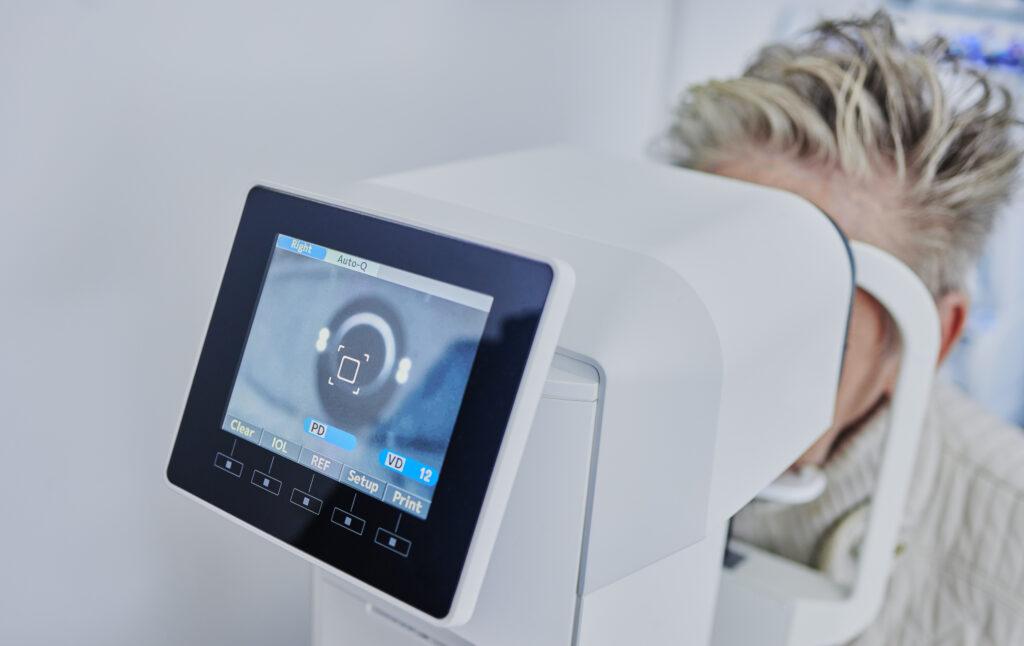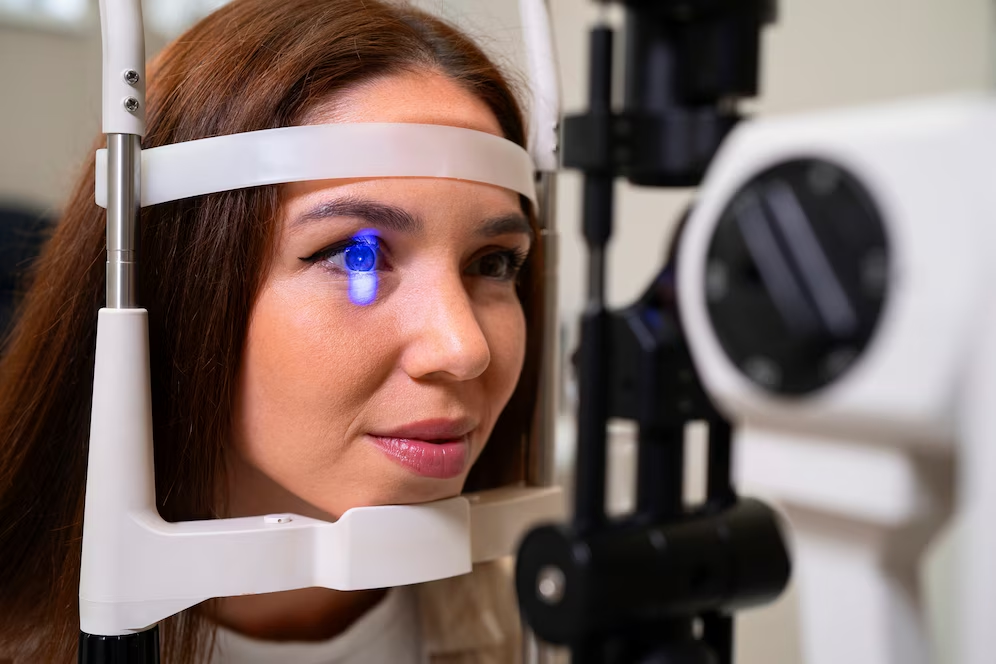
Maintaining good eye health is essential for overall well-being, especially as we age or face risk factors such as diabetes or high blood pressure. At Victoria Village Optometry, we frequently diagnose and manage a range of common eye diseases. Understanding the early signs of eye diseases and knowing when to seek professional care can prevent vision loss and help preserve your quality of life.

Cataracts occur when the eye’s natural lens becomes cloudy, leading to blurry vision, glare sensitivity, and difficulty seeing at night. Cataracts are often age-related, but they can also result from trauma, certain medications, or systemic conditions like diabetes. Cataract diagnosis is typically performed through a comprehensive eye exam, including visual acuity testing, slit-lamp examination, and retinal evaluation. While early cataracts may not impact daily life, advanced cases often require surgical removal and replacement with an artificial lens. Fortunately, cataract surgery is safe and effective, with high success rates in restoring vision. Preventative care, such as wearing UV-protective sunglasses and managing underlying health issues like diabetes, can help delay cataract development. Patients should also avoid smoking, as it increases the risk of cataract formation.

Glaucoma refers to a group of diseases that damage the optic nerve, often due to increased intraocular pressure (IOP). It can lead to irreversible vision loss if not detected early. Glaucoma screening is critical, especially for individuals over 40 or those with a family history of the disease. The screening process includes tonometry (to measure IOP), visual field testing, and optical coherence tomography (OCT) to assess optic nerve health. Because glaucoma often progresses silently, routine eye exams are the most reliable method of detection. Treatment may involve prescription eye drops, oral medications, laser therapy, or surgical procedures to lower IOP and prevent further optic nerve damage. In cases of advanced glaucoma, patients may also benefit from assistive vision tools to maintain independence. Regular follow-ups are essential to ensure the effectiveness of the treatment plan, as glaucoma requires lifelong management.
Diabetic retinopathy is a complication of diabetes that affects the blood vessels in the retina. High blood sugar levels can cause these vessels to leak or become blocked, leading to vision issues.
Early stages of diabetic retinopathy may not produce noticeable symptoms, making regular diabetic eye exams crucial for anyone diagnosed with diabetes. Over time, the condition can cause blurred vision, floaters, and eventually, vision loss.
Treatment options include managing blood sugar levels, laser treatment (photocoagulation), anti-VEGF injections to reduce retinal swelling, and in advanced cases, vitrectomy surgery. Controlling blood pressure and cholesterol is also vital in slowing disease progression.
Patients with diabetes should undergo annual comprehensive eye exams to monitor for early changes in the retina. Early detection allows for timely intervention, significantly reducing the risk of severe vision loss.
Macular degeneration is a leading cause of vision loss in individuals over the age of 60. It affects the macula, the central portion of the retina responsible for sharp, central vision. Patients often report a loss of detail in their central vision, while peripheral vision remains intact.
There are two types: dry AMD and wet AMD. Dry AMD progresses slowly and is more common, while wet AMD can cause rapid vision loss due to abnormal blood vessel growth.
In Toronto, macular degeneration is increasingly recognized as a significant public health issue, particularly as the population ages. Regular eye exams are essential to detect changes early.
Treatment for dry AMD may involve dietary supplements (AREDS2 formulation) and lifestyle changes such as quitting smoking and maintaining a healthy diet rich in leafy greens. Wet AMD typically requires anti-VEGF injections to slow the progression of abnormal blood vessel growth.
Low vision rehabilitation and magnifying devices can also help patients maintain independence when living with advanced AMD.
Recognizing the early signs of eye diseases can be critical in preserving your vision. Some warning signs to watch for include:
If you notice any of these symptoms, it’s important to book an eye exam promptly. At Victoria Village Optometry, we use state-of-the-art diagnostic tools to detect eye disease in its earliest stages.
Ignoring these signs can lead to delayed treatment and increase the risk of permanent vision damage. Routine eye care is a proactive step in safeguarding your vision.
Effective management depends on the specific diagnosis, but eye disease treatment options often include:
Our clinic tailors treatment plans based on individual patient needs, underlying health conditions, and disease severity. Patient education is also a key part of our approach, empowering individuals to actively participate in their eye health.
Routine eye exams are not just for updating your prescription. They play a vital role in detecting and managing eye diseases early. Many eye conditions progress gradually and without pain, making them difficult to detect without professional assessment.
Adults over 40 should have comprehensive eye exams every 1-2 years, or more frequently if they have risk factors like diabetes, hypertension, or a family history of eye disease. Children and young adults should also undergo periodic exams to detect issues early in development.
At Victoria Village Optometry, we offer comprehensive diagnostic services and a patient-first approach. Early intervention can mean the difference between manageable conditions and permanent vision loss.
Our team is experienced in diagnosing, treating, and monitoring a wide range of eye diseases. We emphasize preventative care and patient education to help you maintain optimal eye health throughout your life.
We use advanced imaging technologies, such as OCT and fundus photography, to provide accurate diagnoses. If necessary, we also coordinate care with ophthalmologists and other healthcare providers to ensure you receive comprehensive treatment.
Whether you’re experiencing symptoms or simply due for a check-up, our clinic provides a thorough evaluation and personalized care plan to support your vision for years to come.
The most common eye diseases in adults include cataracts, glaucoma, diabetic retinopathy, and age-related macular degeneration.
Some conditions, like cataracts, can be effectively treated with surgery. Others, like glaucoma or AMD, are managed to slow progression rather than cured. Early detection is key.
You should consider glaucoma screening if you’re over 40, have a family history of glaucoma, are diabetic, or have elevated intraocular pressure. Your optometrist can guide you based on your risk factors.
Healthy habits such as eating a balanced diet rich in leafy greens and omega-3s, managing blood sugar and blood pressure, quitting smoking, and wearing UV-protective eyewear can support long-term eye health.
If you have diabetes, it is recommended to have a comprehensive dilated eye exam at least once a year. More frequent exams may be necessary if diabetic retinopathy is detected.
Yes, aging increases the risk of several eye diseases including cataracts, glaucoma, and macular degeneration. Regular exams become more important with age to detect and manage these conditions early.
Eye diseases can develop silently and progress before symptoms become noticeable. From cataracts and glaucoma to diabetic retinopathy and macular degeneration, early detection and prompt treatment are essential to maintaining vision and quality of life. By staying informed about risk factors and recognizing the early signs of eye disease, patients can take proactive steps toward better eye health.
At Victoria Village Optometry, we are committed to providing exceptional care through accurate diagnosis, customized treatment plans, and patient education. Whether you’re managing a chronic condition or seeking preventive care, our team is here to support your long-term visual wellness.

Our highly trained, compassionate team make the difference between a good and great visit. Located conveniently to serve Toronto residents, we offer hours to suit every family’s schedule.

